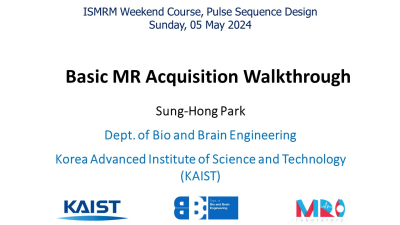Weekend Course
Pulse Sequence Design
ISMRM & ISMRT Annual Meeting & Exhibition • 04-09 May 2024 • Singapore

| 07:45 |
 |
Basic MR Acquisition Walkthrough
Sung-Hong Park
Keywords: Image acquisition: Sequences MRI involves the sequential application of pulsing in RF and gradient coils, known as pulse sequences. This talk aims to explain fundamental concepts on how the gradient and RF pulsing generates an MR image. It covers the mathematical perspective of Fourier transform and the relation between the integral area of the gradient pulsing and the position in k-space. The presentation describes the combined utilization of RF and gradient pulsing for generating tomographic images, elucidating the role of a k-space trajectory in image formation. Key concepts such as slice selection, frequency encoding, phase encoding, and k-space will be explored. |
| 08:15 |
Imaging Acceleration Techniques
Hua Guo
Keywords: Image acquisition: Fast imaging, Image acquisition: Sequences, Image acquisition: Reconstruction Since the advent of MRI technology, image acquisition acceleration has consistently been one of the most prominent research topics in the field. Up to now, sampling acceleration still remains a central focus in MR technology research. Numerous acceleration techniques have been developed, with some already incorporated into products. These techniques include fast imaging sequences, partial Fourier-encoding, parallel imaging, compressed sensing, deep learning, and combinations thereof. Imaging acceleration techniques are widely used in anatomical, functional, and dynamic imaging. This lecture will provide a brief explanation of the fundamental principles behind some of these techniques. |
|
| 08:45 |
Open-Source Pulse Sequence Design & Simulation
Maxim Zaitsev
|
|
| 09:15 |
Break & Meet the Teachers |
|
| 09:45 |
Pulse Sequence Design for MR-Guided Interventions
Adrienne Campbell-Washburn
Keywords: Image acquisition: Sequences, Physics & Engineering: Interventional During an MR-guided intervention, an invasive procedure is performed while the patient is inside the MRI system, and image guidance is used for real-time device navigation or to assess the therapeutic progress. The workflow for MRI-guided interventions differs from typical diagnostic MRI, and these procedures are more demanding on image acquisition and reconstruction times. Therefore, pulse sequences are designed differently. This talk will describe: interactive real-time imaging to enable the navigation of devices through complex anatomy, sequences to visualize interventional devices, thermometry methods to monitor thermal interventions, tracking motion for MRI-guided radiotherapy, and sequence compatibility with low-latency reconstruction. |
|
| 10:15 |
Filling the Gap Between Innovative Sequence Design & Clinical
Practice
Jeanette Schulz-Menger
|
|
| 10:45 |
AI-driven pulse sequence design
Ricardo Otazo
Keywords: Image acquisition: Sequences, Image acquisition: Machine learning Artificial intelligence (AI) provides new tools to solve complex optimization problems, such MRI pulse sequence design. AI can be used to efficiently design the RF pulses and gradient waveforms to achieve the required image contrast and k-space trajectory or to optimize the schedule of acquisition parameters in MR fingerprinting, according to hardware constraints such as gradient amplitude and slew rate. This lecture will review techniques that use AI to design MRI pulse sequences such as AutoSeq, MRZero, and optimization of parameter schedule for MR fingerprinting. The application of ChatGPT for auto-generation of pulse sequence code will be also discussed. |
|
| 11:15 |
Ultimate MR Encoding
Lars Kasper
|
The International Society for Magnetic Resonance in Medicine is accredited by the Accreditation Council for Continuing Medical Education to provide continuing medical education for physicians.